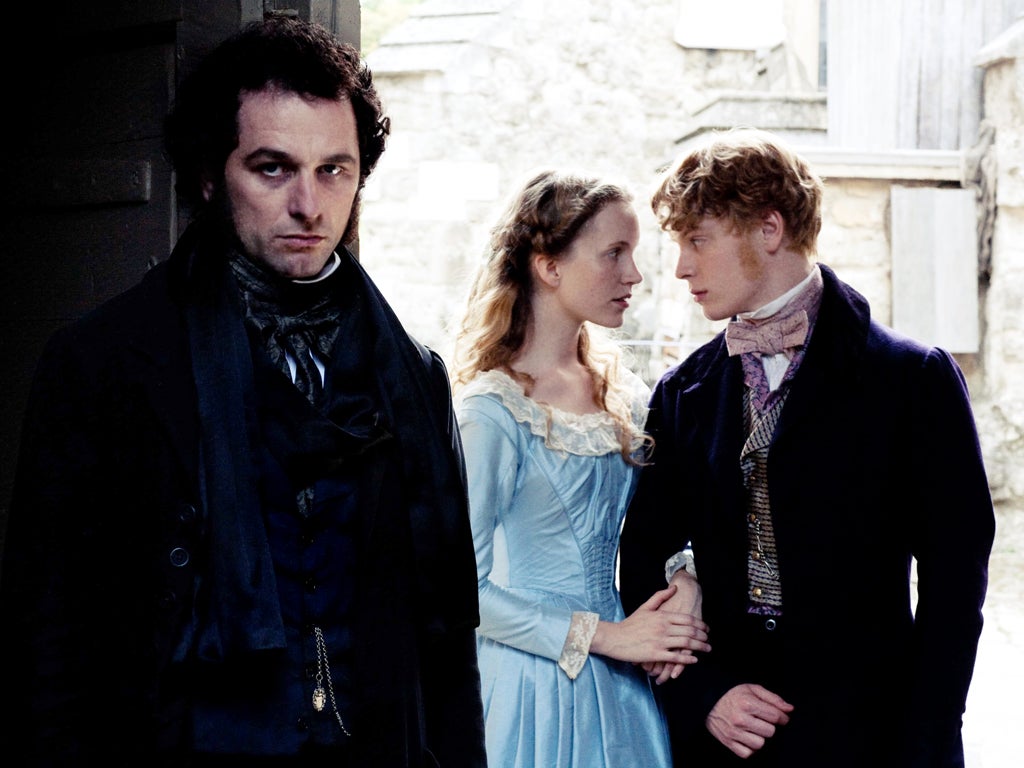The Mystery of Edwin Drood, BBC2, Tuesday and Wednesday Coppers, Channel 4, Monday Borgen, BBC4, Saturday
Screenwriter Gwyneth Hughes makes the most of her licence to finish Dickens's last book

Your support helps us to tell the story
From reproductive rights to climate change to Big Tech, The Independent is on the ground when the story is developing. Whether it's investigating the financials of Elon Musk's pro-Trump PAC or producing our latest documentary, 'The A Word', which shines a light on the American women fighting for reproductive rights, we know how important it is to parse out the facts from the messaging.
At such a critical moment in US history, we need reporters on the ground. Your donation allows us to keep sending journalists to speak to both sides of the story.
The Independent is trusted by Americans across the entire political spectrum. And unlike many other quality news outlets, we choose not to lock Americans out of our reporting and analysis with paywalls. We believe quality journalism should be available to everyone, paid for by those who can afford it.
Your support makes all the difference.Judging by the feedback, adaptations of Charles Dickens's novels aren't necessarily crowd-pleasers. Too many brothel scenes. Too few urchins. Pip's excessively handsome. London's not grimy enough.
Faced with an author many of us have read, we feel entitled to a stance on the fidelity of each treatment.
For once, the screenwriter was free to take liberties in BBC2's The Mystery of Edwin Drood – Dickens died halfway through writing it, providing enough material to set up the intrigue in the first episode, while allowing Gwyneth Hughes to have a bash at resolving it in the second. Since it's also one of Dickens's lesser-read works, you ended up with a bit of telly that could just about be judged on its considerable merits.
From the off it was a strange, delightfully dark little thing, diving straight in to the opium-addled mind of choirmaster John Jasper, who dreams of murdering his "nephew", the foppish Edwin Drood. As the story unfolded, Jasper's very real fixation with Edwin's fiancée, Rosa, emerged; in one scene he observes a sheen of sweat bloom on her neck with frustrated longing so palpable you felt as unsettled as young Rosa herself.
Much credit is due to Matthew Rhys as Jasper, who brought a madly physical intensity to every word and gesture. By the time we saw him throttle young Ned at the end of the first episode, it appeared that there might not be much of a mystery to unravel.
Come the second, Edwin had disappeared, but there was no body, no other credible suspect, and it looked likely that Jasper had merely been having another laudanum-induced reverie. Less a whodunnit, then, than a whodunwhatexactly. Hughes's twist was finally to reveal that a murder had indeed taken place, but not the one we'd expected.
Young Drood turned up safe and well; lots of previously unknown blood-ties were exposed, and antihero Jasper came to a bad end. A little tidily contrived, but then Dickens was fond of a deus ex machina. All in all, it felt less substantial than classic Dickens, but something in that very lightness preserved the atmosphere and texture that are among his writing's greatest charms.
There were no whodunnits for Mansfield CID in the latest documentary series of Coppers, because the answer generally seemed to be Thomas Hodgkinson – at least when the question was burglary. Much of the week's episode was devoted to establishing whether 23-year-old Hodgey, who enjoys an intimate relationship with his local nick, was behind a couple of break-ins. No easy task when his answer to everything, including inquiries about his shoe size, was "no comment".
The interviews with the various officers and Hodgkinson himself involved much grandstanding on both sides. The coppers had few qualms about labelling Hodgkinson and his ilk as "shit", while he suggested that the police are power trippers who were bullied at school . But the interest developed as the reprobate was brought in for questioning – he vulnerable, if infuriating, the officers solicitous, wearily patient, checking whether he'd eaten and had his methadone.

Watch Apple TV+ free for 7 days
New subscribers only. £8.99/mo. after free trial. Plan auto-renews until cancelled

Watch Apple TV+ free for 7 days
New subscribers only. £8.99/mo. after free trial. Plan auto-renews until cancelled
As we saw the police deal with more serious crimes – the discovery of a body and the arrest of a man who'd attempted to rape a young boy – their rhetoric was shown to spring from a daily coexistence with events rarely encountered by most people. Unlike much TV documentary, Coppers doesn't ask big questions only to answer glibly or fudge them timidly. It presents you with a slice of how things are – reality television in the best sense.
Borgen didn't hook me in its first week and I wondered whether the ins and outs of coalition politics in Denmark's parliament would translate quite as well as murder. Surely there's more fun to be had if you can pick out the real-life resemblances in this kind of thing. However, four episodes in and the characters and personal relationships are so well drawn that it's ceased to matter. And if you can't have fun working out the inspirations behind them, there's a good game of "spot The Killing cast" to be played: two more turned up this week.
Join our commenting forum
Join thought-provoking conversations, follow other Independent readers and see their replies
Comments